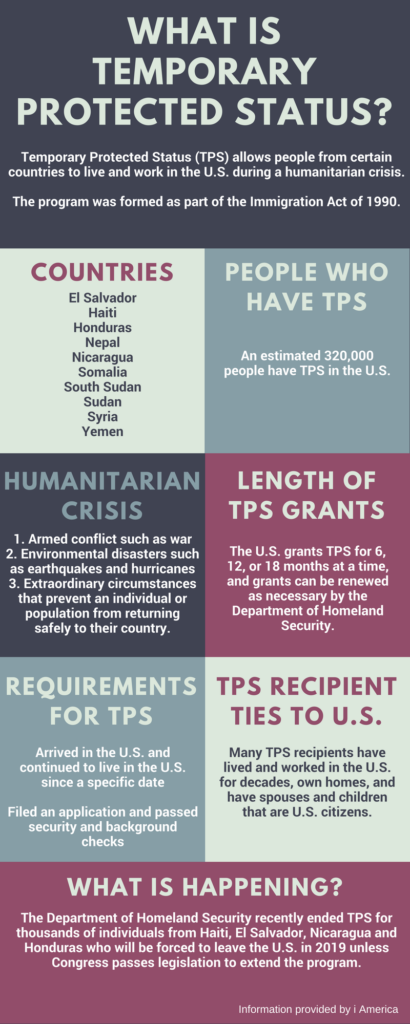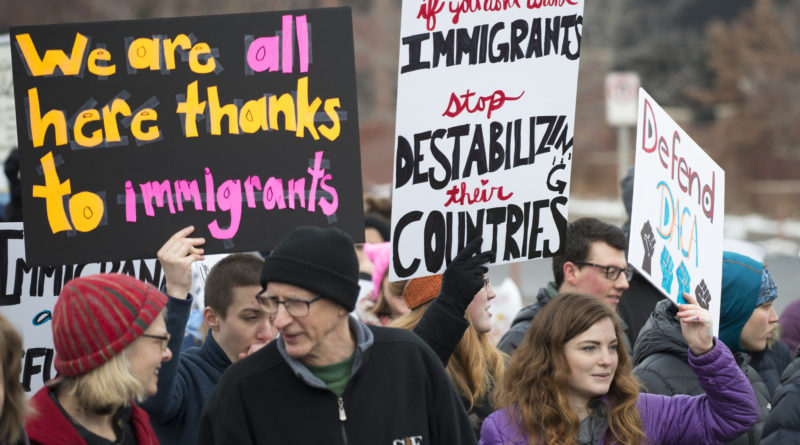TPS Revoked for Thousands of Immigrants

The Temporary Protected Status (TPS) is a temporary immigration benefit created by Congress in the Immigration Act of 1990. TPS provides a temporary immigration status to individuals from specifically designated countries that are unable to handle the return of these individuals due to the state of the country. The Secretary of Homeland Security may grant a country TPS due to ongoing armed conflict, such as civil war, environmental disaster earthquakes, hurricanes, or an epidemic, and other extraordinary and temporary conditions (U.S. Citizenship and Immigration Services).
Since it was first created 22 countries have had TPS. As of August 2017, 10 countries have valid TPS status, including El Salvador, Honduras, Haiti, Syria and Yemen (American Immigration Council). TPS has been granting immigration benefits to individuals of countries in need for almost three decades. However, TPS may be coming to an end for thousands of these individuals.
Halfway through 2017, rumors that TPS could be revoked for multiple countries spread. Thousands of people protected by TPS feared what the future would hold for them if they lost this benefit. Unfortunately, they soon became more than just rumors.
In October 2017, the Trump Administration announced that it may revoke TPS for some countries. This would affect about 300,000 individuals who had been living in the U.S. for many years. Some of the individuals, like those from Honduras, have been in the U.S since 1998. Many of the individuals protected under TPS have built their lives here, many have houses and businesses in this country.
In November 2017, it became more evident that TPS would be revoked for many countries. Honduras, Syria, Haiti and El Salvador in particular were at risk of losing TPS status.
On Monday, November 20, 2017, the Department of Homeland Security announced that it will end TPS for Haiti and Nicaragua beginning January 1, 2018 followed by an 18 month grace period. Once the 18 months pass, thousands of people will have to pack their bags and leave the country they called home. The fear of the termination of TPS grew for Salvadorans and Syrians.
Nearly 20,000 Salvadorans lost TPS in January 2018, and were given until September 2019 to return to El Salvador. The fear for thousands of Syrians grew as yet another country lost their TPS status. However, on Wednesday January 31, 2018, the Trump Administration said that it would allow Syrians to remain in the U.S. for at least another 18 months, at which point they will review the conditions of Syria again and determine whether another extension is necessary.
Although Temporary Protected Status has always been a temporary benefit, many of the beneficiaries of this protection have roots in this country. Many of these people have integrated and contributed to their communities. Many have nothing to return home to, and 18 months is not enough time to relocate everything they have built for themselves and their families in the past decades. Some of these people view the termination of TPS as a death sentence when they think of the condition of their country to which they have to return to.
It is currently uncertain what the future holds for the individuals that have already lost their TPS status and for the countries that still have it. Immigrations lawyers are unsure of what course of action can be taken by these individuals. Thousands of people have only a few months to decide whether they will return to their home countries or remain in the U.S. illegally. The only thing that is certain is that many are at risk of losing everything they have known for almost twenty years.

